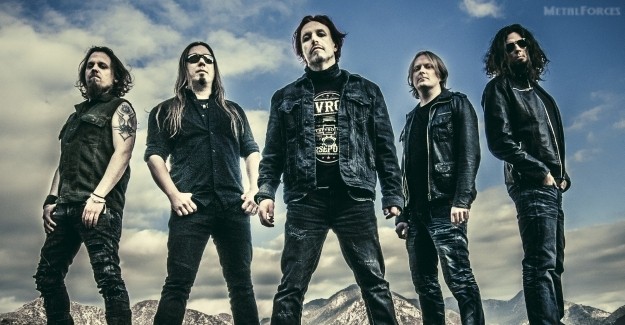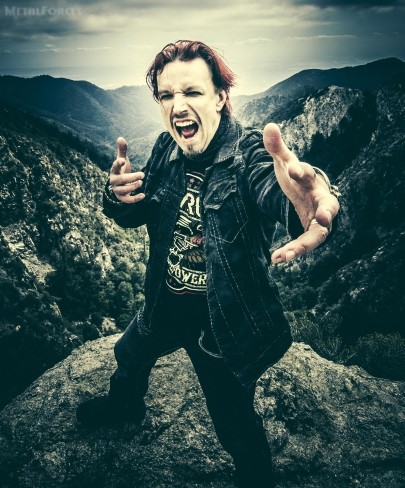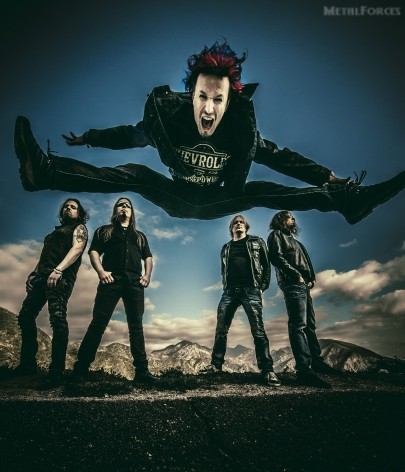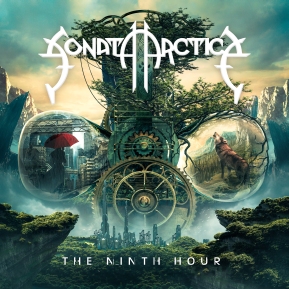
SONATA ARCTICA – Shooting Among The Stars
Anthony Morgan
November 2016

|
![]()
Kemi, Finland-based melodic metal group Sonata Arctica began writing sessions proper for October 2016 full-length studio album The Ninth Hour – their ninth, overall, naturally – during early 2016. At the time, vocalist Tony Kakko was “drawing on blank paper”, so to speak. Predecessor Pariah’s Child had arrived two years earlier, in March 2014.
“I managed to write maybe one or two songs at the time, and was more or less maybe preparing myself for the seven-week North American tour we had with Nightwish,” Tony remembers. “We were opening for them there starting late February 2016, and that kind of slowed me down in terms of the creative process. So, I was in a lot of hurry when I got back home from the tour. I had to basically write, record, and get the album mixed and mastered in three months, and that was kind of an insane pace.
“If you take a look at our touring schedule for last year, you might think that we had a lot of time on our hands. The last show for the Pariah’s Child album was late August I think it was, so there was four months of nothing in our schedule. That was my planned time off from Sonata Arctica though, which is actually the first time ever in the history of the band. I just cut all of the ties for that period of time; I didn’t even wanna think about this band for a short amount of time, and just did other things. I went to Rock In Rio with Nightwish, which was great. I also had a bunch of Christmas shows with this Raskata Joulua project that we have here in Finland around Christmas, and that was a great tour. And of course, I got to spend a lot of time with the family, which is always the best thing ever of course. As a result though, in early January this year, when I planned to start writing the songs I was drawing a blank.
“I was not able to write any Sonata Arctica songs or that kind of music in general, so it was kind of a nightmarish situation, but I don’t know. As they say, diamonds under pressure. We managed to get it done, but anyway. The album, stylistically it was something totally different than what I had in mind. While we were still touring with the previous album, I was telling everybody that the follow-up album would be heavier and more metal in every way, but that didn’t happen obviously. Still though, I think it’s drawing just about a straight line from the previous album. It’s not such a great, big change, a drastic change from the style of the previous album. That’s a good thing in my opinion – that we finally have two albums that are stylistically consistent and in line somehow – because we’ve been jumping around a lot since the Unia album (May 2007).”
The Ninth Hour began to take shape during April. “That was once we got back from the tour,” the singer notes. “Everybody else went into the studio, and started recording like two songs that I had come up with before the tour. The guys went into the studio, and started taking the sounds and getting in the mood of recording the album (laughs). I stayed home writing new songs for like two months. I think I saw the guys once during the whole creative process of this album, which is rare. That’s not really the way I would like to work, but that was the only way I could actually get anything done.
“So, I stayed home and kept writing, and somehow managed to get everything done. So, I’m really happy, but not happy with the way everything went (laughs). It was a lot of stress and kind of ruined my summer, because it was in July when I was still kind of stuck and working on the album. We had a little bit of a delay with the delivery and everything, but shit happens and we survived it. As a result, I hope the next album will be something totally different creatively.”
The “nightmarish situation” of not being able to initially author Sonata Arctica-type compositions cannot be attributed to burn-out, as some might assume. “I had a lot of time off from Sonata Arctica, so there was no burn-out or anything like that,” Tony reiterates. “I was writing songs, but they were totally different – something that I would put on my solo album one day. Usually when I talk about my solo album, I have to combine that sentence with the fact that Sonata Arctica usually steals my solo album material (laughs). This album actually has one song that could have been and would have been on my solo album, and that’s ‘Fly, Navigate, Communicate’.
“I wrote that song for myself, basically, and not for Sonata Arctica. That’s maybe the reason why it stands out as an odd song on the album in some ways, but it still fits in. I didn’t feel burnt out (laughs). Only after the album was done and ready, I felt like ‘Oh god, that was one hard three-and-a-half months.’ It was really nightmarish in that sense, but still, I enjoyed doing what I did. It was intense and good, but really hard.”

|
By comparison to The Ninth Hour’s fellow tracks, ‘Fly, Navigate, Communicate’ is a “much heavier” proposition. “It’s like taking a pop / rock band, and then hitting it with one song from any Devin Townsend Project album, basically,” the mainman laughs. “It’s a different kind of song, stylistically. It’s one of the heaviest songs on the album; it’s got a lot of double-kicks and in a different style than we usually have, and long and winding melodies. When I was writing it, I was heavily influenced by Devin Townsend Project. So, in my opinion, that’s my Devin Townsend Project song. I’m not sure if anyone else can hear that kind of thing, but for me that’s the case. Now that I mention it, of course everybody will point it out immediately (laughs). It’s just different, though. When you listen to the album, it’s odd in a way.
“There’s another song that really doesn’t fit the bill either, and that’s ‘Rise A Night’. Then again though, it’s more traditional Sonata Arctica material. It would have fit on one of the first three or four albums much better than this one, but still, they’re all kind of building bridges across Sonata Arctica albums. Then again though, ‘Fly, Navigate, Communicate’ might be building a bridge to some other place – I don’t know where.”
As referenced, ‘Fly, Navigate, Communicate’ was originally selected to feature on Tony’s as-yet-unreleased debut solo affair. Tony’s aforementioned solo full-length platter has been in the works for quite some time. “I’ve been more or less talking about it for a good 15 years, I think,” he chuckles. “That is ridiculous, because we actually released our first album 17 or 18 years ago (Ecliptica, November 1999). Still, early on in our career though, I started dreaming of a solo album. I always had some material, but Sonata Arctica always stole those songs. Now though, with all of the material that I have kind of piled up over the last few years… I think like the last two years, the thing has been made much more concrete. I have a concept idea for it, and then stylistically, it’s gonna be something totally different from Sonata Arctica. I don’t know how much I should talk about it though, because everything is still kind of subject to change.
“Definitely mind, the songs are not something that I would ever, ever dream of putting on a Sonata Arctica album. That would be a kind of suicide for Sonata Arctica, because that would make yet another weird jump in a totally odd direction. One point of creating a solo project and solo album in the first place is basically to do something totally different from what you normally do. That wouldn’t make any sense, to create a Sonata Arctica-style album under my own name. It would be just odd, weird, but it’s safe to say that maybe in the next ten years, this album will see the light of day (laughs).”
The gestation period for the frontman’s solo jaunt seems to be longer than that of November 2008 Guns N’ Roses opus Chinese Democracy, it is said in jest. “Yeah, I know,” he giggles. “This is my personal Chinese Democracy (laughs). It’s happening, it’s happening (laughs).”
Queen is one specific band Tony is an ardent admirer of. Using Queen as a point of reference, one is reminded of the time vocalist Freddie Mercury issued April 1985 solo venture Mr. Bad Guy. “This is not going to be like that, stylistically,” he laughs. “It’s gonna be heavier with more twists and turns and weird stuff, but something different, anyway. It needs to be something that allows me to breathe, and just stretch my legs and do something wild. Something that allows me to leave all of the too weird material off of the following Sonata Arctica albums, maybe (laughs).
“It doesn’t make to destroy a band that is your main thing with all of the weird stuff that I might and will come up with eventually. There are some albums that might have been better off as my solo works in our career already, so I don’t want to go there any more.”
Such albums include May 2007 offering Unia. “The Unia album, our fifth album, was stylistically such a huge step in some weird direction,” the composer pinpoints. “It was more progressive, and just too busy an album to be a Sonata Arctica album. There are a few songs that are fairly Sonata Arctica, but I think a lot of people would agree – like old school Sonata Arctica fans – that that was an album that threw them totally off. There was also the Stones Grow Her Name album (May 2012), which was a similar kind of jump as Unia but in a totally different direction. It was really simple, and more like a hard rock album or pop album than anything else (laughs). It had its metal moments, but it wasn’t like your normal Sonata Arctica album.
“Still, both Unia and Stones Grow Her Name, some people call those albums their favourite Sonata Arctica albums. So, they have their place in the Sonata Arctica universe as well, even after we release like ten more albums and end our career when we’re like 85 (laughs). All the albums will somehow blend in, and it will all be good.”
Two Sonata Arctica efforts which arguably blend in happen to be The Ninth Hour and Pariah’s Child. “The songs are structurally the same, and you can recognise that these albums belong in the same era of Sonata Arctica in a way,” Tony judges. “That’s the same way you can imagine that the first three albums are like early Sonata Arctica, and then Reckoning Night (September 2004) was already a little tiny change into a different direction. Unia was the main jump into an odd direction, which was a jumping around era for Sonata Arctica. Now, after the Stones Grow Her Name album, Pariah’s Child was our return to what Sonata Arctica is basically about, which is simple metal played in this style of music. Not the way we did with the first two or three albums necessarily, but if you take like the Reckoning Night album, I would imagine…

|
“I always like to think that Pariah’s Child would have fit perfectly after Reckoning Night, where we had like those three albums in-between that are just one-off, weird sidetrack albums (laughs). Unia, The Days Of Grays (September 2009) and Stones Grow Her Name, those were just different. And now we’re back on track, some people might call this new album – The Ninth Hour – the sixth normal Sonata Arctica album. Also, there’s the fact that our logo is pretty much the same on these six albums, and those three adventure albums if you like are just under this different logo. It draws a more direct line. It reflects the normal development span of a band, instead of adding those three albums that I call our adventure albums. They would make all kinds of weird waves, I think.”
Sandwiched between the respective releases of both Pariah’s Child and The Ninth Hour was the 15th anniversary re-recording of November 1999 debut LP Ecliptica, which arrived in October 2014. Nevertheless, said re-recording ultimately failed to musically influence The Ninth Hour. “I don’t think so,” the lyricist observes. “Not really. At the time when I was telling everybody that the next album should be heavier (laughs), The Ninth Hour was still going to be the more metal and more heavy Sonata Arctica album. That was at the time when the new version of Ecliptica was still influencing me. I thought ‘Yeah. This is really, really cool,’ but I don’t know. I had that four months off, and something happened (laughs). I wasn’t able to put my money where my mouth is (laughs), but yeah.
“Everything influences everything, and can somehow add to what you do. You learn from everything, and so maybe remaking Ecliptica was a healthy process. It allowed me to see that we’ve been doing things in a certain way for a long, long time, and now after this period of doing things in a totally different way, we are able to still go back to that early, more simple way of expressing ourselves musically. It was a really nice process, I think, but I don’t know if it really had that big of an impact on the final product, The Ninth Hour.”
Re-recording past works is arguably questionable, although exceptions to the rule do exist. “Our label in Japan requested us to do the thing,” Tony informs. “Our first reaction was like ‘No fucking way we’re gonna do that,’ (laughs) but then again, it was our label in Japan. We have gone through thick and thin ever since the beginning and they are still there, so you couldn’t just go and say ‘No. Fuck you.’ (laughs). We had to basically be diplomatic about it. After long consideration, we kind of found a way to think about the whole process in such a way that it made some tiny sense for us.
“We decided to say ‘Yeah,’ with the noble thought that it would only be released in Japan, which of course didn’t happen. Nuclear Blast obviously wanted to release it as well (laughs), so it became a worldwide release, and now we’re explaining to everybody why we went there and why we did that. It was just to respect and celebrate our debut album again. I would say that the original version is much better; if I had to take one of those on a desert island, I would definitely take the original one.
“It has a lot of things that you can’t remake, like the excitement, the youth, the innocence, and all of those things that you lose when you become a professional at anything, basically. You make such tiny, funny mistakes. There are a lot of faults in the original one, but all of those things, they have that feeling of danger. They have things that make Ecliptica, the original one, what it is really. It just sounds fun; like young kids having fun and going forward full-blast, and it feels like a derailing train all the time (laughs). It’s done, so we can’t take it back any more (laughs). I’m really happy. It also allowed me and gave me a chance to make myself versions of a few songs that I can actually live with, because the original has some moments there that I would just like to erase (laughs). Life is life, though.”
Of tracks featured within the Sonata Arctica catalogue at large, Tony would like to have re-attempted the vast majority. “Yes, absolutely – even on the latest one,” he jokes. “When you listen to them, it’s like ‘Oh God. Now I have a much better idea for that.’ Every time you go on tour and play those songs live, they really find the right form, but only after you get to play them live a little bit. Unfortunately, you can’t do that any more these days because of YouTube and the internet, and people having TV studios in their pocket. That kind of makes it impossible to give those songs a test run before we go into the studio, and it sucks. I hate that; it’s not fun.

|
“I hope so much that people would respect bands and what they do, like their work and everything. And also, it would allow them to have these special moments of hearing a song that’s not been released yet, but that’s all gone, and I don’t think that’s ever, ever coming back. On every album though, there are a lot of moments that I would do differently (laughs). They’re not necessarily bad, but I know that I could do them better in some way. Or, I would like to change some melody line or whatever to make it a little bit better somehow.”
As to why fans record live footage seems unclear, given said footage is generally mediocre at best. “Exactly, yeah, but you can hear what the song is about,” the performer contends. “If that’s the first version you hear of the song that might become your favourite song of all time, who knows? It’s wrong. You should just be able to get your first glimpse. It should be something that you hear live, which sounds much better of course than something that someone has recorded on a cell phone (laughs), or then than the actual album. It’s ruining a lot of good things, I think. It’s sad.”
Resultantly, The Ninth Hour’s respective tracks weren’t trialled on the road prior to its release. Moniker-wise, some would naturally suspect The Ninth Hour takes its name from being album number nine, although deeper connotations exist. “I started the whole naming and the cover art part from the cover artwork itself,” Tony shares. “I was thinking of what to have there, and then finally I came up with this concept. You have like this utopian landscape where everything is perfect and beautiful; human technology and us humans and nature, we are all in harmony and balance, and everything is nice.
“That’s something we should aim at, and it would be perfect, but then I put this hour glass-type construction in the middle there. On the other cup on the left side, you have this dystopia where we are headed if we do not stop polluting and destroying this only home of ours, planet earth. Then on the cup on the right side, we have this other option. We are not here any more; nature has had its chance to heal itself and everything is beautiful, but we are not there any more.
“Then underneath those cups, you have this wheel, and that represents everything we are doing currently to destroy this planet. If we keep messing around with that wheel too much, it’ll tilt eventually in one or another direction, hence choosing one of those two alternatives for the utopia, and that would be our fate basically. Both are pretty miserable in comparison to this utopia. Anyway, once I had this concept together, of course I needed to come up with a name – a name for the baby – and my first thought was obviously that ‘Okay, this is our ninth album, and this is the ninth hour… Ah, okay.’
“That sounds really cool, cheesy and corny at the same time, and it’s biblical, but I’m not really a religious person at all. I had to actually google what all the meanings of the ninth hour are, so I’m not kind of digging myself too big a hole to bury myself in with naming it (laughs). In the end, I found this meaning there that just fit everything perfectly, and it was that God only wants us to repent and to sacrifice on the ninth hour. That was something I took, and that’s the reason the album is called The Ninth Hour.
“We are currently living in times where we need to make sacrifices to allow this planet to survive us – tiny, and big sacrifices. Some tiny ones are just recycling and not consuming so much, and then there are some bigger ones obviously. In many cases, we will and already do repent for the things that we have done. We have destroyed so much of this planet that can’t be fixed any more. Someone said that in like 20 years, we will lose two-thirds of all of the wildlife that we have on this planet, and those are the reasons that we must and we will feel sorry. It’s pretty awful what we have done here in the short period of time that we have actually existed as human beings here. That’s basically why the name is The Ninth Hour, and what you have on the cover.”
This interviewer isn’t hopeful. “I still have my hopes,” the musician reckons. “We need laws to take care of things. It has to be the same law for everybody – for individuals, and companies, and nations – and it has to be harsh, and it has to be drastic, or we are fucked, basically. I still have a hope and dream, though. I have children myself, so it would be a nightmare. Of course, that’s my biggest fear; that we are gonna leave them in some weird dystopia here. So, let’s hope.
“That’s the only thing that I can do, and of course teach them to live in a nature-respecting way, and try my best to not destroy this planet. We should all do the same thing, because you wouldn’t toss your own tiny baby into a pool of poison, basically. When they are like 70 or 80-years-old though, they are still going to be your children, your babies. They might be forced to do that, to swim in poison, but would you feel any better about that? That’s something that we are headed towards, definitely.”
Related Posts via Categories
- SONATA ARCTICA – Shooting Among The Stars, Part Two (October 2016) | Features / Interviews @ Metal Forces Magazine
- SONATA ARCTICA – Songs Grow Their Name (May 2012) | Features / Interviews @ Metal Forces Magazine
- SONATA ARCTICA – Stones Grow Her Name (2012) | Album / EP Reviews @ Metal Forces Magazine
|
|





